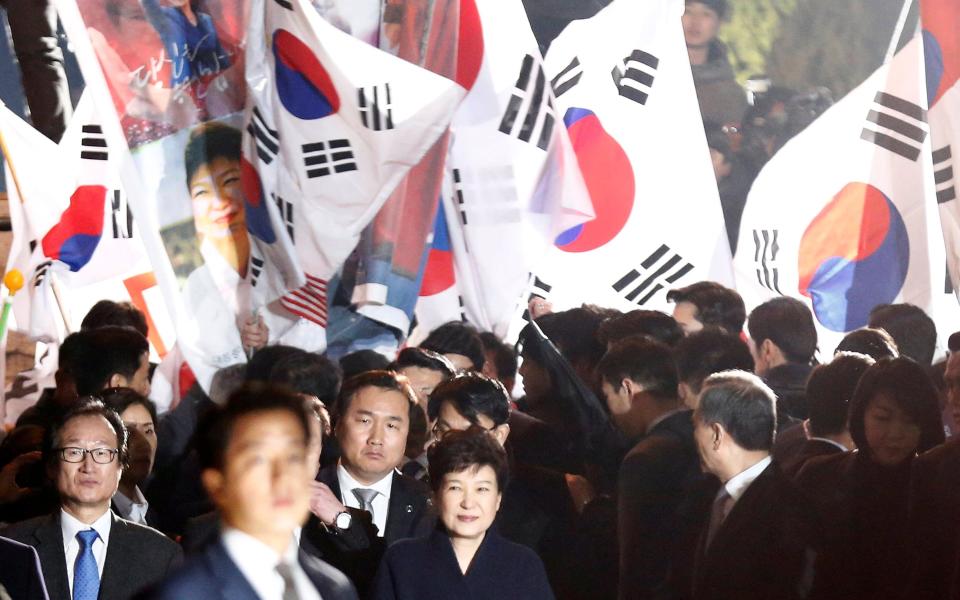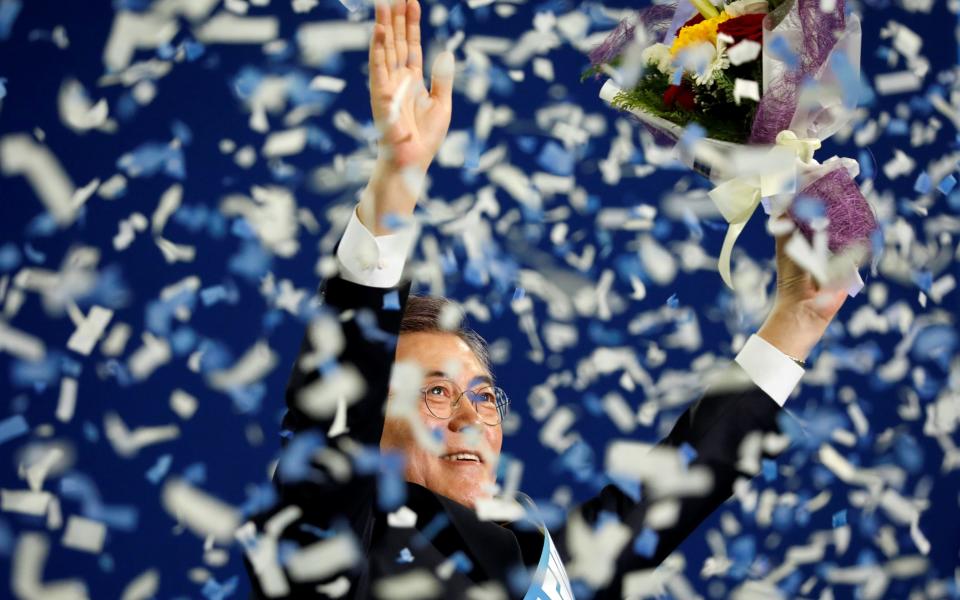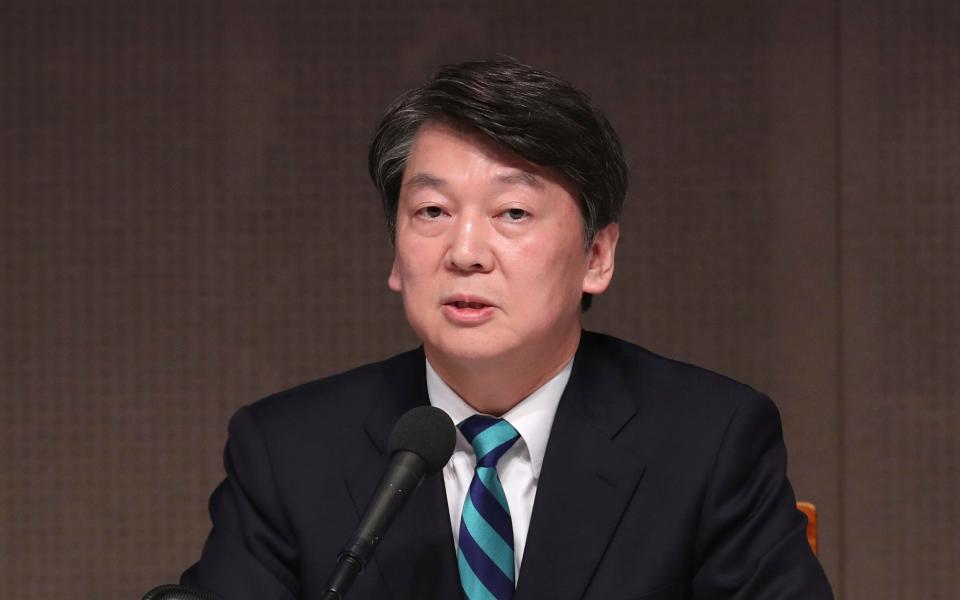South Korea election: Who will replace impeached leader Park Geun-hye and what's at stake?

South Korea, Asia’s fourth largest economy, faces an early presidential election on May 9th following the impeachment of president Park Geun-hye.
But who are the frontrunners and what's at stake for the 50-million-strong country neighbouring North Korea and sitting at the heart of one of the world's most volatile regional flashpoints?
Here's everything you need to know.

Why is South Korea holding an early election?
South Korea has been in political turmoil since last autumn, when an influence-peddling and corruption scandal involving President Park Geun-hye, her close confidante, Choi Soon-sil, and some of the country’s biggest companies, hit the headlines.
Allegations that Park had colluded with Choi to pressure corporations to donate millions of dollars in return for political favours, prompted mass public protests demanding her resignation.
In December, Park, 65, was impeached by parliament, a decision that was backed in March by the highest court in the land making her the first democratically-elected South Korean leader to be forced from office, four years into her five year term.
Prosecutors have now charged Park for bribery, abuse of authority, coercion and leaking government secrets. The former president has been detained pending her trial.
Her impeachment triggered a fresh election campaign and the polling date has been set for May 9th.
Who are the frontrunners?
Moon Jae-in, 64, a former human rights lawyer and candidate for the left-leaning Democratic Party, and Ahn Cheol-soo, 55, a former doctor turned computer tycoon running for the centre-left People’s Party.
Recent opinion polls put them as receiving more than 80 per cent of public support between them.
Moon Jae-in, a left-leaning candidate who favours talks with North Korea
Until last week Moon Jae-in looked like he had a clear path to the presidency, but he now faces a serious challenge from Ahn Cheol-soo, who is sweeping up conservative voters who favour stronger national security policies.
Moon lost the 2012 election to Park after he was perceived to be too soft on North Korea. The son of North Korean parents, who escaped South in 1950 during the war, Moon is an advocate of the so-called “sunshine policy” of engagement with Pyongyang that was pursued by previous liberal presidents who tried to build trust with the North through investment, exchanges and aid programmes.

Moon still favours sanctions but has pledged to deal with North Korea’s nuclear ambitions through direct talks with dictator Kim Jong-un. The presidential candidate recently said that South Korea should “take the lead” in the region, rather than play “spectator” to China and the US.
Moon says he is committed to the US-Korea alliance as the foundation of Seoul’s diplomacy but has expressed caution about the deployment of THAAD. He favours delaying the decision until after the election so that the next president can decide whether it is worth the risk of worsening relations with China.
Despite the foreign policy challenges, Moon says his priority for office will be to restore public faith in political institutions, create employment and address the economic inequalities which lie behind plummeting birthrates. He has pledged to introduce better paternity leave and state-funded day-care centres.
Ahn Cheol-soo, a moderate who also wants to negotiate with the North
Ahn Cheol-soo, the moderate candidate who leads the centre-left People’s Party, surprised the nation before the campaign began when he suddenly surged forward to a neck-and-neck position with Moon.
Later polls show that Moon has regained his lead, but Ahn remains a serious challenge. This has partly been attributed to his perceived tougher stance on national security winning over former Park supporters.
He backs the American anti-missile system, and approves of international sanctions on North Korea over its much-feared nuclear programme. However, Ahn, like Moon, would support talks with Pyongyang.

“What is the purpose of putting sanctions against North Korea? Because we would like to persuade them to come to the negotiating table,” he said.
The former medical doctor has gained fame for inventing popular anti-virus software and has a reputation as a mentor for young people.
He has also pledged to address public “disappointment” with politicians who only look out for their own interests.
“There’s not a liberal Korea and a conservative Korea, there’s a people’s Korea,” he said after winning his party’s nomination.
North Korea's nuclear history: key moments
What's happened to Park's party?
Park’s conservative party, in disarray over the impeachment scandal, has split. Those who remain loyal to her have named themselves Liberal Party Korea and will be led by Hong Joon-pyo, a former prosecutor and self-described “strongman” who favours the redeployment of nuclear weapons to the South.
Conservatives who supported Park’s removal from office formed the Bareun Party, appointing Yoo Seong-min as their candidate. Sim Sang-jung of the progressive Justice Party has joined the main contenders.
None of them are expected to perform well, but may choose to drop out and give their support to Ahn.
Fringe candidates include a shaman from the sacred mountain Gyeryongsan, a former spy agency chief, and “Dr Corn”, an agricultural scientist credited with creating a new hybrid of the vegetable.
What are the main issues facing South Korea?
Korean Peninsula
International tensions over the Korean Peninsula have mounted over recent weeks as the US government has hinted at taking military options against North Korea’s missile and nuclear programmes.
In an apparent show of force earlier this month, the US said it had diverted its Carl Vinson naval strike group to Korean waters amid rising fears that Pyongyang could imminently carry out its sixth nuclear bomb test or launch a long-range missile. However, the fleet was revealed to still be thousands of miles away last weekend when North Korea staged a massive military parade, flaunting a possible intercontinental ballistic missile.
Tensions remain high and South Korea’s leaders have appealed for calm. Their capital, Seoul, lies within easy striking range of the North Korean border and military conflict would be catastrophic, both economically and in terms of high civilian casualties.
China
Meanwhile, tensions have also risen with neighbouring China over a decision by Seoul’s outgoing administration to allow the US to deploy its THAAD anti-missile system on South Korean territory.
Fierce Chinese opposition has sparked a damaging informal boycott of South Korean goods and a reduction in tourism.
Economy
Domestically, the sluggish performance of the export-orientated economy has led to anger among the younger generation about the growing gap between rich and poor.
South Korea’s jobless rate rose to a seven year high of 5 per cent in February, with young people taking the biggest hit. Last year youth unemployment approached 10 per cent and only about half of college graduates are able to secure full-time positions.
Younger people complain there are few opportunities without connections in the family-run conglomerates, or chaebols, that dominate the economic landscape. Failing to secure a good job, fewer young people are choosing to marry and have children, leading to stubbornly low birthrates and a looming demographic timebomb.
A book titled “I hate Korea” has become a bestseller among the younger generation.
What will the election mean for the wider region?
The election result is set to bring a strategic shift in regional politics which may reduce tensions with North Korea, but worsen them with the United States.
Both leading candidates sit to the left of the disgraced former President Park, whose conservative party for the past ten years has been in sync with Washington’s tough approach on North Korea and less inclined to use diplomatic outreach to bring Pyongyang back in from the cold.
While both Moon and Ahn view their alliance with the US as the bedrock of South Korean foreign policy, their intention to pursue talks with Kim Jong-un could cause them to clash with the Trump administration’s emerging hardline stance against the North.
Meanwhile, Ahn’s backing of THAAD would win him allies in Washington, but place him on a collision course with Beijing.
Seoul-based analysts have welcomed the prospect of talks with the North. “I think it’s a good thing,” said John Delury, a professor of East Asian studies at Seoul’s Yonsei University.
“From a US perspective, the only way you are going to make headway on a problem like North Korea’s nuclear weapons is to start talking with them.”

